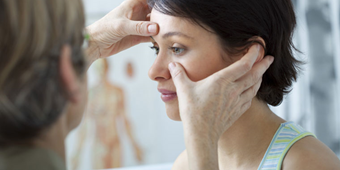Depression: More Than Just the Blues

Answer a few questions and we'll provide you with a list of primary care providers that best fit your needs.
Everyone feels blue or sad now and then. These feelings are usually short-lived and pass within a couple of days. Depression, on the other hand, interferes with daily life and causes pain for both you and those who care about you.
Minor depression is characterized by having symptoms for two weeks or longer that do not meet full criteria for major depression. Without treatment, people with minor depression are at risk for developing major depression. Depression usually starts between the ages of 15 and 30, and is more common in women.
Symptoms Of Depression
Signs and symptoms of depression include:
- Persistent sad, anxious, or "empty" feelings
- Feelings of guilt, worthlessness, or helplessness
- Irritability, restlessness
- Loss of interest in activities once pleasurable, including sex
- Fatigue and decreased energy
- Difficulty concentrating, remembering details, and making decisions
- Insomnia, early-morning wakefulness, or excessive sleeping
- Overeating or appetite loss
- Aches or pains, headaches, cramps, or digestive problems that do not ease even with treatment
Some types of depression tend to run in families. However, depression can occur in people without family histories of depression, too. Trauma, loss of a loved one, a difficult relationship, or any stressful situation may trigger a depressive episode.
How Do Women Experience Depression?
Depression is more common in women than men. Biological, life cycle, and hormonal factors may be linked to women's higher depression rate.
During the transition into menopause, some women experience an increased risk for depression. In addition, osteoporosis—bone thinning or loss—may be associated with depression.
Many women face the stresses of work and home responsibilities, caring for children and aging parents, abuse, poverty, and relationship strains. It is still unclear, though, why some women faced with enormous challenges develop depression, while others do not.
How Do Men Experience Depression?
Men often experience depression differently than women. Men are more likely to be very tired, irritable, lose interest in once-pleasurable activities, and have difficulty sleeping.
Men may be more likely than women to turn to alcohol or drugs when they are depressed. They also may become frustrated, discouraged, irritable, angry, and sometimes abusive. Some men throw themselves into their work to avoid talking about their depression.
Causes Of Depression
Many factors can cause depression, including:
- Alcohol or drug abuse
- Certain types of cancer
- Death of a relative or friend
- Divorce, including a parent’s divorce
- Failing a class
- Illness in the family
- Job loss
- Long-term pain
- Sleeping problems
Diagnosing And Treating Depression
Depression, even the most severe cases, can be treated. The earlier treatment begins the more effective it is.
The first step is to visit your doctor who can rule out conditions that exhibit symptoms similar to depression by doing a physical exam, interview, and lab tests. If the doctor can find no medical condition causing the depression, the next step is a psychological evaluation.
Your doctor may refer you to a mental health professional, who should discuss with you any family history of depression or other mental disorder, and get a complete history of your symptoms. Tell her when symptoms started, how long they have lasted, how severe they are, and whether they have occurred before and if so, how they were treated.
Treatment will depend on your symptoms. For mild depression, counseling and self-care may be enough. The most effective therapy for moderate or severe depression is a combination of antidepressant medication and talk therapy.
No matter what type of depression and how severe it is, the following steps can help:
- Get enough sleep
- Follow a healthy diet
- Exercise regularly
- Avoid alcohol and drugs
- Get involved in activities that make you happy
- Spend time with family and friends
- Practice meditation, tai chi, or other relaxation methods
- Add omega-3 fatty acids to your diet through supplements or by eating fish
Helping a Loved One Who Is Depressed
The most important thing to do is help your friend or relative get a diagnosis and treatment. You may need to make an appointment and go with him or her to see the doctor. Encourage your loved one to stay in treatment, or to seek different treatment if no improvement occurs after six to eight weeks.
Answer a few questions and we'll provide you with a list of primary care providers that best fit your needs.




